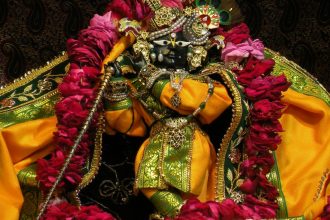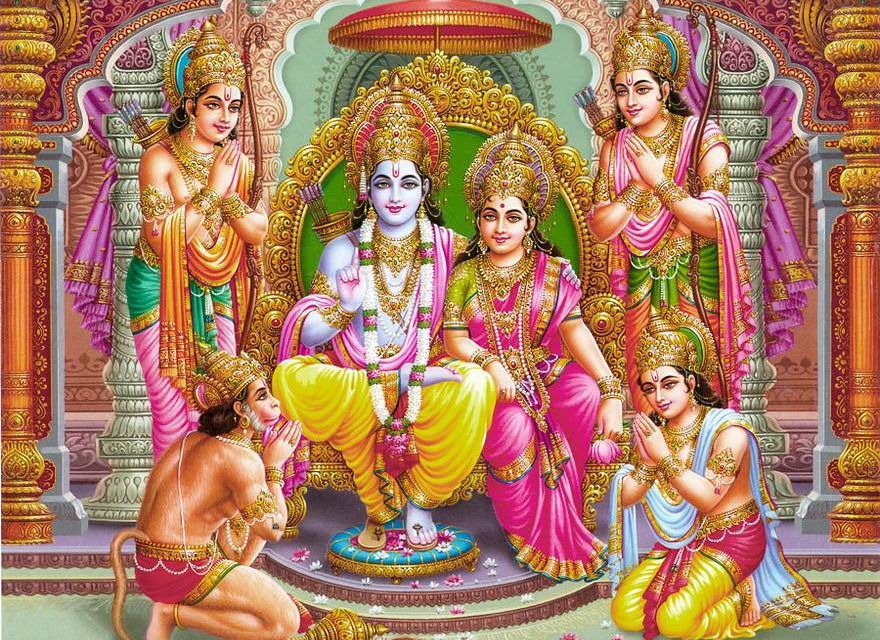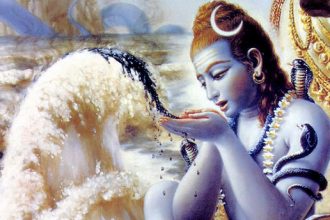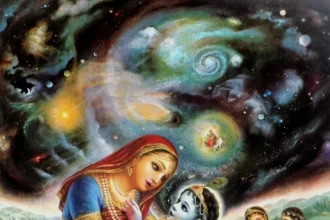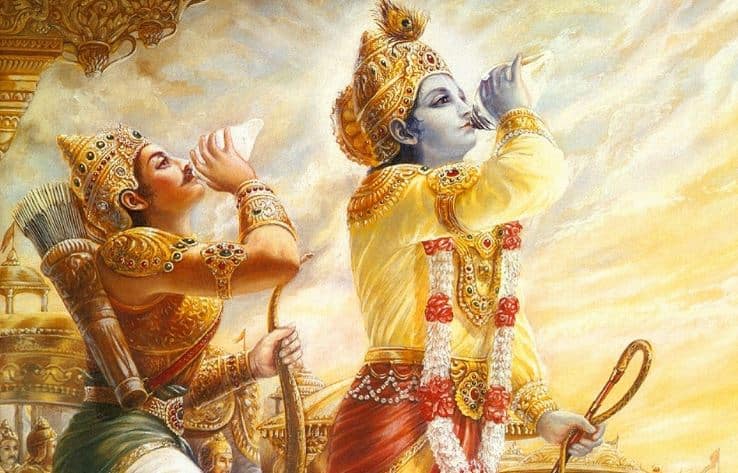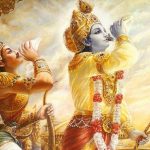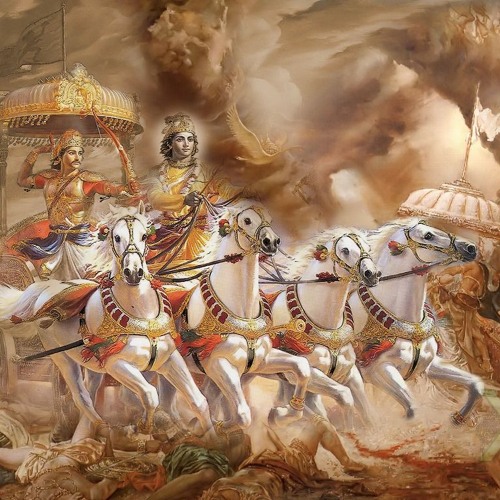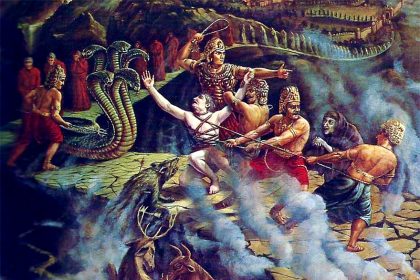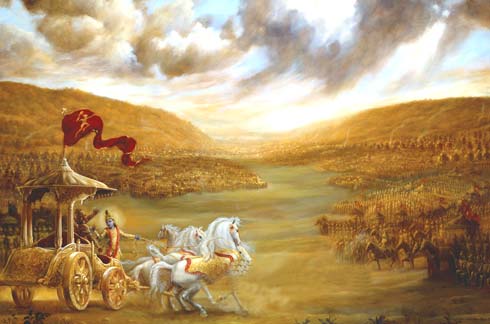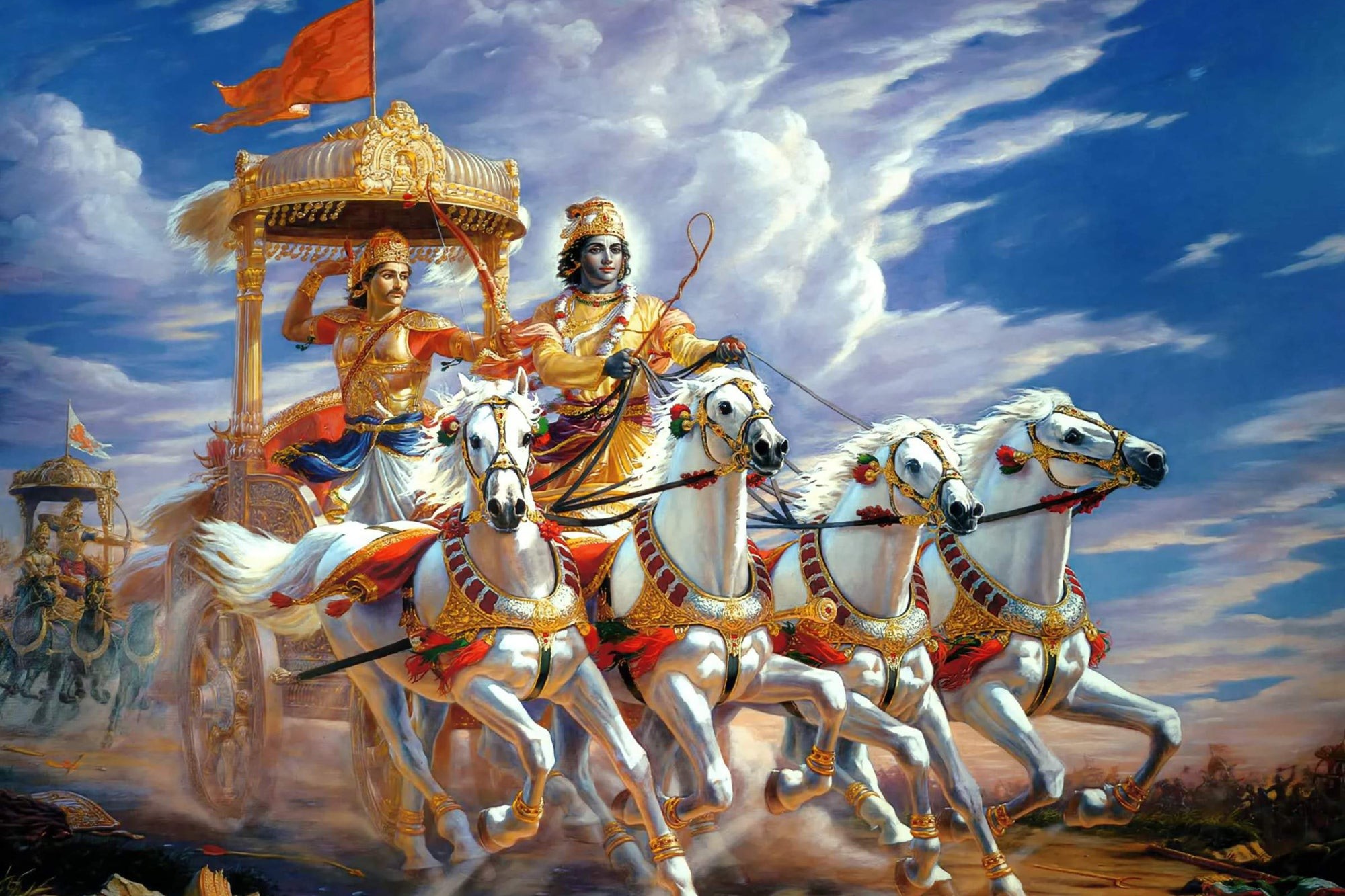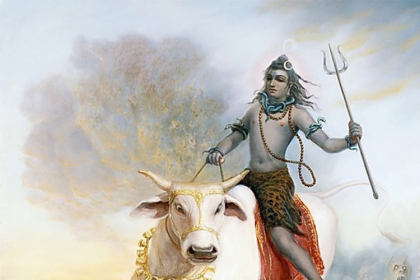TEXT 1
arjuna uvāca
sannyāsaṁ karmaṇāṁ kṛṣṇa
punar yogaṁ ca śaṁsasi
yac chreya etayor ekaṁ
tan me brūhi su-niścitam
SYNONYMS
arjunaḥ uvāca—Arjuna said; sannyāsam—renunciation; karmaṇām—of all activities; kṛṣṇa—O Kṛṣṇa; punaḥ—again; yogam—devotional service; ca—also; śaṁsasi—You are praising; yat—which; śreyaḥ—is more beneficial; etayoḥ—of these two; ekam—one; tat—that; me—unto me; brūhi—please tell; su—niścitam—definitely.
TRANSLATION
Arjuna said: O Kṛṣṇa, first of all You ask me to renounce work, and then again You recommend work with devotion. Now will You kindly tell me definitely which of the two is more beneficial?
PURPORT
In this Fifth Chapter of the Bhagavad-gītā, the Lord says that work in devotional service is better than dry mental speculation. Devotional service is easier than the latter because, being transcendental in nature, it frees one from reaction. In the Second Chapter, preliminary knowledge of the soul and its entanglement in the material body were explained. How to get out of this material encagement by buddhi-yoga, or devotional service, was also explained therein. In the Third Chapter, it was explained that a person who is situated on the platform of knowledge no longer has any duties to perform. And in the Fourth Chapter the Lord told Arjuna that all kinds of sacrificial work culminate in knowledge. However, at the end of the Fourth Chapter, the Lord advised Arjuna to wake up and fight, being situated in perfect knowledge. Therefore, by simultaneously stressing the importance of both work in devotion and inaction in knowledge, Kṛṣṇa has perplexed Arjuna and confused his determination. Arjuna understands that renunciation in knowledge involves cessation of all kinds of work performed as sense activities. But if one performs work in devotional service, then how is work stopped? In other words, he thinks that sannyāsa, or renunciation in knowledge, should be altogether free from all kinds of activity, because work and renunciation appear to him to be incompatible. He appears not to have understood that work in full knowledge is nonreactive and is therefore the same as inaction. He inquires, therefore, whether he should cease work altogether or work with full knowledge.
TEXT 2
śrī-bhagavān uvāca
sannyāsaḥ karma-yogaś ca
niḥśreyasa-karāv ubhau
tayos tu karma-sannyāsāt
karma-yogo viśiṣyate
SYNONYMS
śrī-bhagavān uvāca—the Personality of Godhead said; sannyāsaḥ—renunciation of work; karma—yogaḥ—work in devotion; ca—also; niḥśreyasa—karau—leading to the path of liberation; ubhau—both; tayoḥ—of the two; tu—but; karma-sannyāsāt—in comparison to the renunciation of fruitive work; karma-yogaḥ—work in devotion; viśiṣyate—is better.
TRANSLATION
The Personality of Godhead replied: The renunciation of work and work in devotion are both good for liberation. But, of the two, work in devotional service is better than renunciation of work.
PURPORT
Fruitive activities (seeking sense gratification) are cause for material bondage. As long as one is engaged in activities aimed at improving the standard of bodily comfort, one is sure to transmigrate to different types of bodies, thereby continuing material bondage perpetually. Śrīmad-Bhāgavatam (5.5.4-6) confirms this as follows:
nūnaṁ pramattaḥ kurute vikarma
yad indriya-prītaya āpṛṇoti
na sādhu manye yata ātmano ‘yam
asann api kleśa-da āsa dehaḥ
parābhavas tāvad abodha-jāto
yāvan na jijñāsata ātma-tattvam
yāvat kriyās tāvad idaṁ mano vai
karmātmakaṁ yena śarīra-bandhaḥ
evaṁ manaḥ karma-vaśaṁ prayuṅkte
avidyayātmany upadhīyamāne
prītir na yāvan mayi vāsudeve
na mucyate deha-yogena tāvat
“People are mad after sense gratification, and they do not know that this present body, which is full of miseries, is a result of one’s fruitive activities in the past. Although this body is temporary, it is always giving one trouble in many ways. Therefore, to act for sense gratification is not good. One is considered to be a failure in life as long as he makes no inquiry about his real identity. As long as he does not know his real identity, he has to work for fruitive results for sense gratification, and as long as one is engrossed in the consciousness of sense gratification one has to transmigrate from one body to another. Although the mind may be engrossed in fruitive activities and influenced by ignorance, one must develop a love for devotional service to Vāsudeva. Only then can one have the opportunity to get out of the bondage of material existence.”
Therefore, jñāna (or knowledge that one is not this material body but spirit soul) is not sufficient for liberation. One has to act in the status of spirit soul, otherwise there is no escape from material bondage. Action in Kṛṣṇa consciousness is not, however, action on the fruitive platform. Activities performed in full knowledge strengthen one’s advancement in real knowledge. Without Kṛṣṇa consciousness, mere renunciation of fruitive activities does not actually purify the heart of a conditioned soul. As long as the heart is not purified, one has to work on the fruitive platform. But action in Kṛṣṇa consciousness automatically helps one escape the result of fruitive action so that one need not descend to the material platform. Therefore action in Kṛṣṇa consciousness is always superior to renunciation, which always entails a risk of falling. Renunciation without Kṛṣṇa consciousness is incomplete, as is confirmed by Śrīla Rūpa Gosvāmī in his Bhakti-rasāmṛta-sindhu:
prāpañcikatayā buddhyā hari-sambandhi-vastunaḥ
mumukṣubhiḥ parityāgo vairāgyaṁ phalgu kathyate
“When persons eager to achieve liberation renounce things related to the Supreme Personality of Godhead, thinking them to be material, their renunciation is called incomplete.” Renunciation is complete when it is in the knowledge that everything in existence belongs to the Lord and that no one should claim proprietorship over anything. One should understand that, factually, nothing belongs to anyone. Then where is the question of renunciation? One who knows that everything is Kṛṣṇa’s property is always situated in renunciation. Since everything belongs to Kṛṣṇa, everything should be employed in the service of Kṛṣṇa. This perfect form of action in Kṛṣṇa consciousness is far better than any amount of artificial renunciation by a sannyāsī of the Māyāvādī school.


